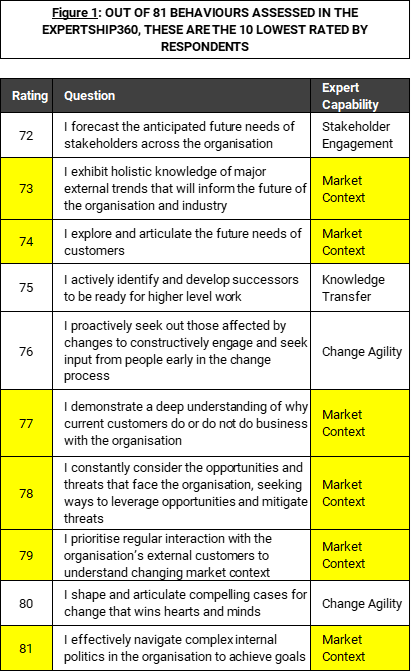Leaders of IT functions aspire to build the capability of their most technical IT team members to be more business rounded, and therefore much more valuable to the team and the organisation. But how do we develop these skills? New research from Expertunity – based on extensive survey data – might suggest the answer.
By Darin Fox, Head of Research, and Alistair Gordon, Head of Programs, Expertunity
One thing senior IT leaders constantly tell us is that they seek to have IT professionals on their team who are technically brilliant, but also highly effective at interacting with the broader organisation.
These employees are few and far between and are worth their weight in gold.
The secret to their success is that they:
• Have taken the time to deeply understand their organisation, and the customers or citizens they serve.
• They strive to be the best in class, so focus on benchmarking their efforts against competitors or alternatives.
• Can speak the language of non-technical people.
In short, they demonstrate mastery of business acumen (or what at Expertunity we call Market Context).
The latest data suggests that the skills listed above are a blind spot for most technical experts (whether in IT, finance, science or engineering).
The good news is that senior IT leaders have some steps open to them to address this capability gap.
How big is the deficit in capability?
Using data we have analysed from assessments completed by stakeholders of 400 technical subject matter experts we’ve worked with in the last 18 months, market context/business acumen is the skill technical experts are least good at.
Figure 1 describes the “bottom 10” behaviours data gleaned from our 360-degree surveys of participants on our Mastering Expertship program. Market Context behaviours account for 6 out of the lowest 10 rated behaviours in our model.

Source: Expertunity Research, Study of anonymised Expertship360 multi-rator survey data from 2023. N~434 surveys, n~4553 respondents, 373,000 data points.
So what is Market Context?
Senior technical leaders will recognise the Market Context behaviours in their most strategic and valuable experts. Market Context is the key to seamlessly acquiring, retaining, refreshing, and deploying a wealth of contextual, organisational, competitive, and customer knowledge in order to shape better systems, solutions, products, and services.
The best expert performers not only possess an advanced understanding of the entire organisation but also exhibit a strategic, political, and business acumen that sets them apart. They navigate organisational intricacies, comprehend the competitive landscape, and forge connections with or about customers, all while staying ahead of emerging trends that could potentially influence future outcomes.
They are what we call Master Experts – demonstrating not only advanced technical proficiency, but also are strategically aligned with the broader organisation and its customers/citizens.
Why is Market Context the lowest scoring capability?
There are several interconnected reasons. These include:
• Experts have typically focused on improving their technical skills – which is after all, their ticket to the game. Acquiring business acumen skills is not prioritised.
• Many IT professionals don’t believe business acumen is required to execute their role proficiently. They don’t understand how important understanding the big picture is.
• Experts often find themselves operating in a technical bubble, where they are so busy delivering work and solutions that they don’t have time to contemplate the bigger picture.
• Experts are rarely proactive around discovering stakeholder needs. They tend to be stuck in reactive mode.
Because of these factors, experts often find themselves less attuned to the broader organisation, sometimes being wrongly perceived as uninformed or, worse, disinterested.
Consequently, their value tends to be confined solely to their technical outputs, sidelining them from becoming holistic and indispensable contributors to strategy and innovation initiatives.
This is the cycle senior IT leaders should (and can) seek to break by having their technical superstars become organisational superstars – via a mastery of Market Context. The good news is that some small efforts can harvest significant returns.
How do senior technical leaders develop market context skills and behaviours in their most technical team members?
Senior IT leaders themselves can contribute to this learning by emphasising the importance of understanding the wider context of the organisation, and creating the opportunity for their technical stars to do this.
Senior IT leaders could, for example, commit to executing these three powerful, proven-to-work initiatives:
1. Become a champion of getting technical experts to understand how important market context can be to their work being more valuable and focused.
-
Regularly invite members of the organisation who interface with strategy, customers, and external stakeholders to come and talk to your group about their needs.
-
Ask team members to explore competitors (or global best practice same-purpose organisations if in the public sector), and report back on their positioning, competitive /efficiency advantage, strengths and weaknesses. Help them become students of the wider market.
-
Support experts’ access to customer data, competitor insights, and strategic information held by other teams. Emphasise the importance of understanding the underlying rationale driving strategic decisions.
2. Embed an intimate understanding of strategy.
-
Rather than simply socialise the organisation’s strategy deck, discuss it in depth, ensuring the IT team members, however deeply technical, are able to articulate it and its connection to the work the IT department does.
-
Encourage experts to establish alliances with the strategy team. Help experts understand why this is the strategy.
-
Help experts explore how they could contribute to helping the organisation execute strategy.
3. Help experts start communicating with the wider organisation more effectively.
-
Motivate experts to practice translating their technical solutions into plain English descriptions that connect the solutions to strategy, customers/citizens and competitive/service advantage.
-
Regularly offer feedback on how they might fine tune their “pitch”.
Tools to help you help your IT stars overcome their blind spots
Over the past five years, Expertunity has developed a series of tools that support these learning initiatives. These include publications available for purchase, assessments, and learning programs. A synopsys of these tools is described here.
Summary
A lack of business acumen gets in the way of IT teams providing break-through solutions and services to their organisations.
A greater understanding of Market Context can help deeply technical specialists see the bigger picture, have more influence, be much more valuable to the organisation, and will likely stay longer.
Senior IT leaders can, with minimum effort and expense, really move the needle for their IT specialists by deploying and leveraging the ideas above, and the tools available from providers like Expertunity.
Further reading
How to use Expertship self-assessment to coach your technical team to develop their business skills
Explore deploying The Expertship360.
Explore other articles on our blog for senior technical heads, The Technical Leader Blog.




